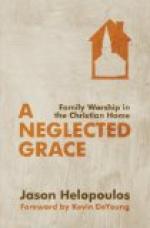or a high social position in this life; he receives
a title to and personal meetness for, the undefiled
and imperishable inheritance of heaven, composed of
glittering crowns of glory, of unspeakable joys, and
sweet communion with all the loved and cherished there.
Thus the fruits of a parent’s labor for the salvation
of his children constitute an infinitely more valuable
patrimony than all the accumulated fruits of his industry
in behalf of wealth. All the wealth, and rank,
and reputation which may descend from parent to child,
can not supersede the necessity of a spiritual patrimony.
It is only, as we have seen in a former chapter, when
you minister to the spiritual wants of your children
and tinge all their thoughts and feelings with a sense
of eternity; when your home is made a spiritual nursery;
and you work for their eternal benefit, and thereby
secure for them the fulfillment of those blessed promises
which God has given concerning the children of believing
parents, that you leave them a patrimony worthy the
Christian home. Such a spiritual patrimony it
is within the power of all Christian parents to bestow.
And without its enjoyment by your children, you fail
to minister unto them as a faithful steward of God.
You may minister to their bodies and minds; you may
amass for them a fortune; you may give them an education;
you may establish them in the most lucrative business;
you may fit them for an honorable and responsible
position; you may leave them the heritage of social
and political influence; and you may caress them with
all the passionate fondness of the parental heart and
hand; yet, without the heritage of true piety,—of
the true piety of the parent reproduced, in the heart
and character of the child, all will be worse than
vain, yea, a curse to both the parent and the children.
Having thus briefly pointed out some of the essential
features of the children’s patrimony, as physical,
intellectual, moral, and spiritual, we shall now advert
to the principles upon which parents should proceed
in the distribution of their property to their children.
They should not give them more than a competency.
That they should lay by something for them is conceded
by all. This is both a right and a duty.
It is included in the obligation to provide for them;
and he who does it not “hath denied the faith
and is worse than an infidel.” Natural affection,
as well as supernatural faith, stimulates the parent
to provide thus for his offspring.
But this does not demand a great fortune; but a simple
competency, that is, just enough to meet their immediate
wants and emergencies when they enter the world and
begin business-life. This competence should correspond
with the social position they occupied under the parental
roof. It should not go beyond this; it should
be just enough to meet the social and financial exigencies
of the child. It should be measured also by the
peculiar necessities of the child, by his health,
abilities and circumstances. “A parent
is justified,” says Paley in his Moral and Political
Philosophy, “in making a difference between
his children according as they stand in greater or
less need of the assistance of his fortune, in consequence
of the difference of their age or sex, or of the situations
in which they are placed, or the various success which
they have met with.”




